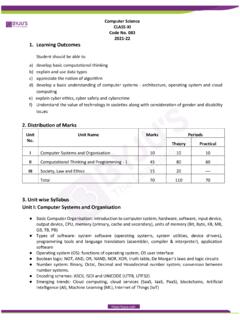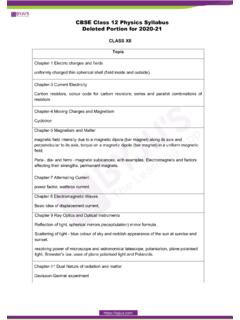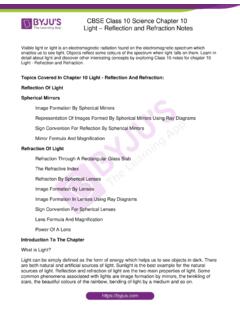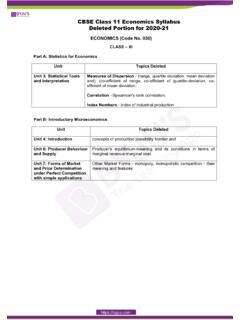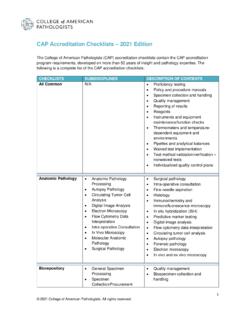Transcription of CBSE Class 12 Chemistry Deleted Syllabus Portion for 2020-21
1 Class -XII S No Unit Portion to be Reduced 1 Solid State Electrical and magnetic properties. Band theory of metals, conductors, semiconductors and insulators and n and p type semi conductors. 2 Solutions Abnormal molecular mass, Van't Hoff factor 3 Electrochemistry Lead accumulator, fuel cells, corrosion, law of electrolysis (elementary idea), dry cell- electrolytic cells and Galvaniccells, 4 Chemical Kinetics Concept of collision theory (elementary idea, no mathematical treatment), activation energy, Arrhenius equation. 5 Surface Chemistry emulsion - types of emulsions, catalysis: homogenous and heterogeneous, activity and selectivity of solid catalysts; enzyme catalysis, 6 General Principles and Processes of Isolation of Elements Entire unit 7 p-BlockElementsPreparation and properties of Phosphine, Sulphuric Acid: industrial process of manufacture, Oxides of Nitrogen (Structure only); Phosphorus - allotropic forms, compounds of Phosphorus: Preparation and properties of Halides and Oxo acids (elementary idea only).
2 8 d and f Block Elements Chemical reactivity of lanthanoids, Actinoids -Electronic configuration, oxidation states and comparison with lanthanoids. Preparation and properties of KMnO4 and K2Cr2O7 9 Coordination Compounds Structure and stereoisomerism, importance of coordination compounds (in qualitative analysis, extraction of metals and biological system). 10 Haloalkanes and Haloarenes Uses and environmental effects of -dichloromethane, trichloromethane, tetrachloromethane, iodoform, freons, DDT. 11 Alcohols, Phenols and Ethers uses with special reference to methanol and ethanol. 12 Aldehydes, Ketones and Carboxylic Acid --- 13 Amines Diazonium salts: Preparation, chemical reactions and importance in synthetic organic Chemistry .
3 CBSE Class 12 Chemistry Syllabus Deleted Portion for 2020-2114 Biomolecules Oligosaccharides (sucrose, lactose, maltose), polysaccharides (starch, cellulose, glycogen), importance of carbohydrates. Vitamins classification and functions. Enzymes. Hormones -Elementary idea excluding structure. 15 Polymers entire chapter 16 Chemistryin Everydaylife entire chapter Practical Following portions should be considered Deleted . A. Surface Chemistry a. Preparation of one lyophilic and one lyophobic sol Lyophilic sol - starch, egg albumin and gum Lyophobic sol - aluminium hydroxide, ferric hydroxide, arsenous sulphide. b. Dialysis of sol-prepared in (a)above. c. Study of the role of emulsifying agents in stabilizing the emulsion of different oils.
4 B. Chemical Kinetics a. Effect of concentration and temperature on the rate of reaction between Sodium Thiosulphate and Hydrochloric acid. b. Study of reaction rates of any one of the following: i) Reaction of Iodide ion with Hydrogen Peroxide at room temperature using different concentration of Iodideions. ii) Reaction between Potassium Iodate, (KIO3) and Sodium Sulphite: (Na2SO3)using starch solution as indicator (clock reaction). C. Thermo Chemistry Any one of the following experiments i) Enthalpy of dissolution of Copper Sulphate or Potassium Nitrate. ii) Enthalpy of neutralization of strong acid (HCI) and strong base(NaOH). iii) Determination of enthaply change during interaction (Hydrogen bond formation) between Acetone and Chloroform.
5 D. Electrochemistry Variation of cell potential in Zn/Zn 2+|| Cu2+/Cu with change in concentration of electrolytes (CuSO4 or ZnSO4) at room temperature. G. Preparation of Organic Compounds Preparation of any one of the following compounds i) Acetanilide ii) Di-benzal Acetone iii) p-Nitroacetanilide Aniline yellow or 2 - Naphthol Anilinedye
